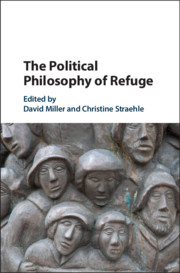Book contents
- The Political Philosophy of Refuge
- The Political Philosophy of Refuge
- Copyright page
- Contents
- Contributors
- Introduction
- Chapter 1 Differentiating Refugees
- Chapter 2 The State’s Right to Exclude Asylum-Seekers and (Some) Refugees
- Chapter 3 Asylum, Speech, and Tragedy
- Chapter 4 Border Rescue
- Chapter 5 Selecting Refugees
- Chapter 6 Refugees and the Right to Remain
- Chapter 7 The Duties of Refugees
- Chapter 8 Is Return the Preferred Solution to Refugee Crises?
- Chapter 9 Refugees and the Right to Return
- Chapter 10 Refugees, Rescue, and Choice
- Chapter 11 Philosophical Foundations for Complementary Protection
- Chapter 12 The Ethics of Sanctuary Policies in Liberal Democratic States
- Bibliography
- Index
Chapter 9 - Refugees and the Right to Return
Published online by Cambridge University Press: 01 November 2019
- The Political Philosophy of Refuge
- The Political Philosophy of Refuge
- Copyright page
- Contents
- Contributors
- Introduction
- Chapter 1 Differentiating Refugees
- Chapter 2 The State’s Right to Exclude Asylum-Seekers and (Some) Refugees
- Chapter 3 Asylum, Speech, and Tragedy
- Chapter 4 Border Rescue
- Chapter 5 Selecting Refugees
- Chapter 6 Refugees and the Right to Remain
- Chapter 7 The Duties of Refugees
- Chapter 8 Is Return the Preferred Solution to Refugee Crises?
- Chapter 9 Refugees and the Right to Return
- Chapter 10 Refugees, Rescue, and Choice
- Chapter 11 Philosophical Foundations for Complementary Protection
- Chapter 12 The Ethics of Sanctuary Policies in Liberal Democratic States
- Bibliography
- Index
Summary
The moral challenge of asylum and refuge arises from the internationally accepted principle of non-refoulement laid out in Article 33 of the Geneva Convention. The moral logic of non-refoulement is the implicit acknowledgement of the need for help: ‘Whenever a state acknowledges that it would be wrong to send someone back to her home country, it is implicitly recognizing that person as a refugee …, that is, as someone whose situation generates a strong moral claim to admission in a state in which she is not a citizen.’ Signatory states of the Geneva Convention are prohibited from immediately refusing asylum claims of those who request refuge. Instead, states are mandated to evaluate refugees’ demands for asylum fairly by assessing the human right violations the migrant has suffered in the past, and the likelihood of suffering grave human rights violations in the future if she were sent back into her country of origin.
- Type
- Chapter
- Information
- The Political Philosophy of Refuge , pp. 174 - 192Publisher: Cambridge University PressPrint publication year: 2019
- 1
- Cited by

